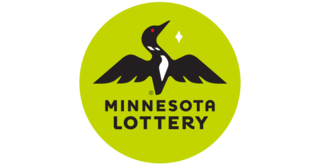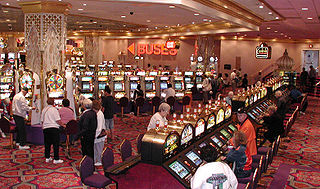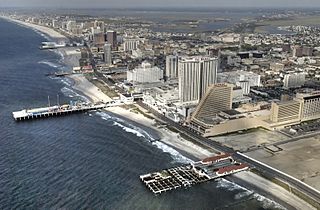
A lottery is a form of gambling that involves the drawing of numbers at random for a prize. Some governments outlaw lotteries, while others endorse it to the extent of organizing a national or state lottery. It is common to find some degree of regulation of lottery by governments. The most common regulation is prohibition of sale to minors, and vendors must be licensed to sell lottery tickets. Although lotteries were common in the United States and some other countries during the 19th century, by the beginning of the 20th century, most forms of gambling, including lotteries and sweepstakes, were illegal in the U.S. and most of Europe as well as many other countries. This remained so until well after World War II. In the 1960s, casinos and lotteries began to re-appear throughout the world as a means for governments to raise revenue without raising taxes.
Online gambling is any kind of gambling conducted on the internet. This includes virtual poker, casinos, and sports betting. The first online gambling venue opened to the general public was ticketing for the Liechtenstein International Lottery in October 1994. Today, the market is worth around $40 billion globally each year, according to various estimates.
Gambling in the United Kingdom is regulated by the Gambling Commission on behalf of the government's Department for Digital, Culture, Media and Sport (DCMS) under the Gambling Act 2005. This Act of Parliament significantly updated the UK's gambling laws, including the introduction of a new structure of protections for children and vulnerable adults, as well as bringing the burgeoning Internet gaming sector within British regulation for the first time.

The Minnesota State Lottery, or Minnesota Lottery, is a government agency that operates lotteries in the U.S. state of Minnesota. The state’s lottery system was established in 1988 through a successful voter referendum that amended the state’s constitution. Lottery revenue is paid out towards prizes, administrative expenses, and retailers, and the remaining proceeds are split between environmental conservation funds and the state's general fund. The Minnesota Lottery participates in the Multi-State Lottery Association and several other multi-jurisdiction games. In-house draws include Pick 3, Gopher 5, and North 5, among many other games and offerings.

In the United States, gambling is subject to a variety of legal restrictions. In 2008, gambling activities generated gross revenues of $92.27 billion in the United States.

The Ministry of Finance is a Swedish government ministry responsible for matters relating to economic policy, the central government budget, taxes, banking, security and insurance, international economic work, central, regional and local government.

The Treasury of the Isle of Man is the finance department of the Isle of Man Government. It prepares the annual budget for the Government, and also handles taxation, customs and excise, economic affairs, information systems, internal audit, currency and the census in the Isle of Man.
The Virginia Lottery is an independent agency of the Commonwealth of Virginia. It was created in 1987 when Virginians voted in a statewide referendum in favor of a state lottery. The first ticket was sold on September 20, 1988. All profits from Virginia Lottery ticket sales go to K-12 public education, as required by Virginia's constitution. In Fiscal Year 2022, the Lottery's profits totaled more than $779.6 million, accounting for approximately 10 percent of school funding in Virginia. That brought total Lottery profits in Virginia to more than $14.5 billion.
Internet in Estonia has one of the highest penetration rates in the world. In the first quarter of 2010, 75% out of 1.34 million people in the country used the Internet according to Statistics Estonia. In 2017, according to the World Bank came 13th in the world by the percentage of population using the Internet, with 88.1% people using it.
Gambling in South Africa has been heavily restricted since 1673, with South Africa's Gambling Act of 1965 officially banning all forms of gambling except betting on horse racing which existed as a sporting activity.

Gambling in Russia is legal in four regional subject areas, and in 2009 was made illegal in all other areas of Russia.
Gambling in Pennsylvania includes casino gambling, the Pennsylvania Lottery, horse racing, bingo, and small games of chance conducted by nonprofit organizations and taverns under limited circumstances. Although casino gaming has been legal for less than two decades, Pennsylvania is second only to Nevada in commercial casino revenues.

Government revenue or national revenue is money received by a government from taxes and non-tax sources to enable it to undertake public expenditure. Government revenue as well as government spending are components of the government budget and important tools of the government's fiscal policy. The collection of revenue is the most basic task of a government, as revenue is necessary for the operation of government, provision of the common good and enforcement of its laws; this necessity of revenue was a major factor in the development of the modern bureaucratic state.

Gambling in New Jersey includes casino gambling in Atlantic City, the New Jersey Lottery, horse racing, off-track betting, charity gambling, amusement games, and social gambling. New Jersey's gambling laws are among the least restrictive in the United States. In 2013, the state began to allow in-state online gambling. Five years later, the state won a lawsuit that dismantled Nevada's monopoly on legal sports betting.
Gambling in Estonia is relatively young. While Estonia was a part of the USSR, all types of gambling activities were banned. Despite the prohibition, illegal casinos still functioned, but the real history of gambling started in 1994-1995 when the first Lottery Act of 1994 and the first Gambling Act of 1995 came into power. As the capitol, Tallinn has more casinos than any other Estonian town. As of September 2010, there were 33 casinos in Tallinn. That's 3 times less than in 2008, when 91 gambling venues operated in this city. According to experts, the main reasons for such decrease were the consequences of the crisis and the adoption of the new gambling law in 2008. The legal age for playing at casinos is 21.

Taxes provide an important source of revenue for various levels of the Government of the Republic of China. The tax revenue of Taiwan in 2015 amounted NT$2.1 trillion.
Taxation in Estonia consists of state and local taxes. A relatively high proportion of government revenue comes from consumption taxes whilst revenue from capital taxes is one of the lowest in the European Union.

A referendum on legalising web shops and establishing a national lottery was held in the Bahamas on 28 January 2013. Both proposals were rejected by voters.
Tax and Customs Service is the customs service of the Republic of Poland and is the uniformed and armed law enforcement agency component within the National Revenue Administration, operating its own tactical units, subordinate to the Polish Ministry of Finance. In its current form, it was established in 2017 by merging the pre-existing Polish Customs Service, created in 1999 from the reformed Central Customs Office until 1953 known as Central Board of Customs, with the fiscal control service, and incorporating it together with the tax administration into the newly established KAS umbrella structure. It is responsible for assessing and collecting customs duties and excise, exercising customs control, primarily at the Poland's borders, the entire tax intelligence, targeted fiscal inspections, supervision of legal and combatting illegal gambling, as well as exercising tasks related to tax, customs and illegal gambling investigations in criminal cases, including tactical operations.

Gambling, other than betting on horse races or the government-sponsored Thai lottery, is prohibited in Thailand. The prohibition dates back to the Gambling Act 1935. The Playing Cards Act prohibits private ownership of more than 120 playing cards without approval of the government. Nevertheless, illegal gambling in casinos and other forms of gambling still exist in Bangkok and some provincial towns.










